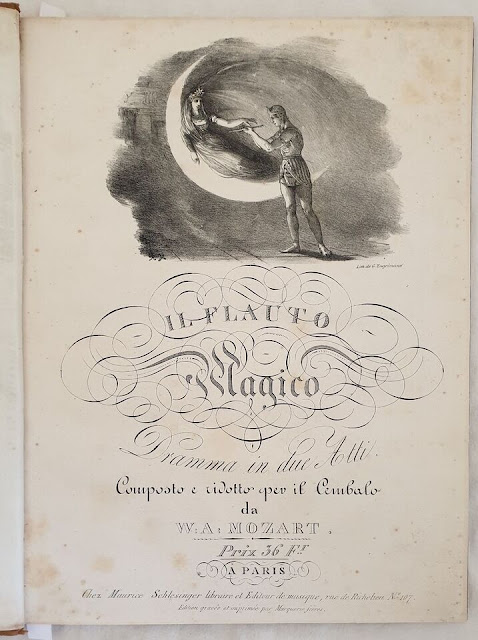.
And so, I opened Mr Wilson's volume at page 1. ‘Away with melancholy’. By Mozart. Really? Hey, I know
that tune … well, goodness me!
Mozart and Shickaneder’s
Die Zauberflöte must be one of the
best loved and most performed operas in the world. These days. But, speaking
from an Anglophone point of view, it originally didn’t hold a candle to Don Giovanni or the current bastardised
versions of The Marriage of Figaro. Not until long after its initial production
did it become a regular item in the opera houses of the English-speaking world.
But, by the time it finally made it to an English stage, twenty years after its
Viennese production, some pieces of the Zauberflöte
score had become highly popular. So popular, indeed, that folk looked upon
them as English ballads, and had no idea that they had originated in a German
Singspiel. And the most famous of these was the piece entitled ‘Away with
Melancholy’.
I don’t know when the
song was first performed, and never can I find the name of the ‘poet’
mentioned, but the first mentions of published music I can find is in the
listings of Longman and Broderip in 1797 when the duet ‘The Manly Heart’ and ‘Within
these sacred bowers’ are offered at a shilling apiece. And their former
employee William Rolfe puts out ‘Away with Melancholy’.
So what is this number?
Not the bravuras of the Queen of the Night, nor the glorious melodies of the
lovers … no, it is the little tune ‘Das klinget so herrlich’ with which Papageno
and his bells set the moor Monastatos and his minions a-dancing.
However, in 1808 the Queen of the Variations (vocal),
Angelica Catalani, composed her own set of variations, which she interpolated
into a revival of Paisiello’s La
Frascatana and Fioravanti’s Le
Virtuose in Puntiglio and later his La
Sposa Stravagante.
The little tune, become a little ballad, had become a
full-sized vocal showpiece. I see Mrs Salmon and Elizabeth Feron singing it
(separately) in the following years, before the full opera got its first
performance at the King’s Theatre 6 June 1811 for buffo star Naldi to play
Papageno at his Benefit. In Italian. Hurriedly put up, its libretto
incomprehensible to most, it was only liked for its music. Not all of which
seems to have been from Die Zauberflöte. The
Papagena of the occasion, Mme Collini, announced its repetition for her
Benefit, but when the day came, she and Madame Bertinotti just sang some of the
numbers.
So, the introduction
of Il Flauto magico to England was
not precisely a happy one. ‘That popular Scottish tune’ ‘Away with melancholy’
sung by Signor Righi seems to have been the highlight of the night.
Bits of Die Zauberflöte continued to appear in
concert. The overture was played at the Hereford Festival between the acts of Acis and Galatea, Catalani opened her
Benefit concert with it but then gave arias by Portogallo, Paisiello and
Nasolini. No Mozart. A selection from the opera was given at Drury Lane with
keyed harmonica accompaniment (‘O cara armonia’), and in 1818 another
selection, featuring Mrs Salmon, was given there at the oratorios, before in
1819 (25 May) the piece was tried again at the King’s. Much better cast (Mmes
Bellochi, Corri, Angrisani, Ambrogetti and Begrez as Monastatos) it did rather
better, but it did not establish itself, as ‘Away With Melancholy’ went into
its umpteenth edition.
Sadly, Mr Shade
didn’t date his imprint. I’d guess it’s somewhere between 1815-1825. It’s a two
soprano version, of utter simplicity, where the two voices sing endlessly in
thirds, so I guess made for the infant market. That’s where it ended up,
anyway. I see on you tube there are versions by various juvenile pianists, including
one very deliberate one by a lass of four. From Mozart to ‘Scottish ballad’ to Catalani to
kiddie exercise. But Monastatos’s little dance has lasted over two centuries in
its ‘adapted’ forms!
 |
| A French arragement |
And an Italian one .. arranged for Harpsichord .. reduced to two acts? date?










No comments:
Post a Comment